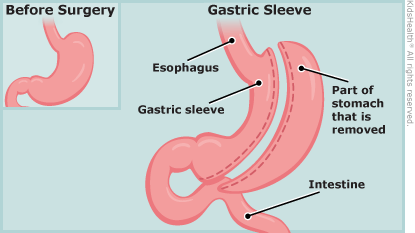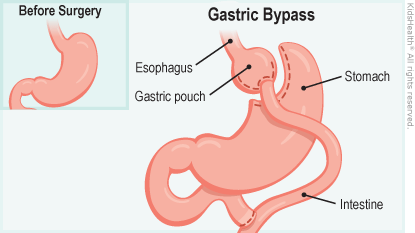Weight Loss Surgery
What Is Weight Loss Surgery?
Sometimes, being overweight can lead to serious health problems. People who are 100 or more pounds over their ideal body weight are more likely to develop medical problems. These problems include diabetes, heart disease, sleep apnea , liver disease, and joint problems.
Weight loss surgery (also called bariatric surgery) can help very overweight people who have tried but failed to lose weight and face serious medical problems. But it's not a quick fix. People need to put in a lot of hard work before and after the operation.
The two main kinds of surgery for weight loss in teens are gastric sleeve and gastric bypass.
What Is Gastric Sleeve Surgery?
Gastric sleeve (also called sleeve gastrectomy) is the most common weight loss procedure. With this operation, the surgeon removes part of the stomach and makes a tube or "sleeve" out of the rest of the stomach. The new, banana-shaped stomach is much smaller than the original stomach. Part of the stomach that's removed makes hormones that increase appetite and help control insulin. So, a person's appetite decreases and insulin resistance improves after gastric sleeve surgery.
After the operation, a person will eat less, feel full sooner, and be less hungry. The gastric sleeve operation only changes the stomach. The gastric sleeve procedure is not reversible.

What Is Gastric Bypass Surgery?
In a gastric bypass (also called "Roux-en-Y" gastric bypass), a surgeon creates a small pouch at the top of the stomach. This pouch becomes the new stomach. Surgeons then connect the pouch to the middle part of the small intestine, bypassing the upper part of the small intestine.
After the surgery, the stomach pouch holds a lot less food than a normal-sized stomach. A person will eat less, feel full sooner, and be less hungry. And fewer calories and nutrients are absorbed because the small intestine is shorter.
People who get gastric bypass tend to lose more weight than people who get the gastric sleeve, but there can be more problems too. The gastric bypass procedure is not reversible.

Who Can Get Weight Loss Surgery?
Figuring out if an overweight teen can get weight loss surgery requires a team approach. This includes the teen and his or her family, doctors, dietitians, exercise specialists, and psychologists.
Teens can be considered for weight loss surgery if:
- They have a high body mass index (BMI) with serious medical problems caused by weight, like diabetes, heart disease, liver disease, or sleep apnea.
- They have a BMI of 40 or more, or are 100 or more pounds over their ideal body weight.
Teens must be committed to making the lifestyle changes needed for success and have the support of their families to help them do so.
What Are the Risks of Weight Loss Surgery?
Weight loss surgery, like any surgery, does come with risks. People who've had weight loss surgery may have pain, nausea, vomiting, diarrhea, and acid reflux (heartburn) after eating — especially if they eat too much or too quickly.
Uncommon but more serious problems include:
- bleeding
- a bad reaction to anesthesia
- infection near the cuts used for the surgery
- a leaky stomach or intestine, which can lead to an infection of the area around the stomach and other organs
- a blood clot in the legs or lungs
- blockage in the intestines
- gastroesophageal reflux
- vitamin and mineral deficiencies
- weight regain
"Dumping syndrome" is a problem mainly seen with gastric bypass. This is when food moves too quickly through the stomach and intestines, causing nausea, dizziness, sweating, stomach cramps, and diarrhea. Eating high-sugar or high-fat foods makes dumping worse, so people who have had weight loss surgery need to be careful about what they eat.
Mental health problems, such as depression and anxiety, are a concern before and after surgery. Most people feel better about themselves after weight loss surgery, but some may continue to struggle. It is important for people who have had weight loss surgery to follow up with their mental health professional and get help if they feel overwhelmed or sad, or have other emotional concerns.
What Else Should I Know?
Weight loss surgery is not a quick fix. But the hard work may be worth it for people who are very overweight and have serious health problems because of their weight.
If you're worried about your teen's weight and think he or she may benefit from weight loss surgery, talk to your doctor.
Reviewed by: Kirk W. Reichard, MD
Date Reviewed: Nov 30, 2019
















